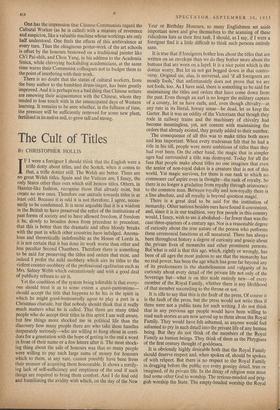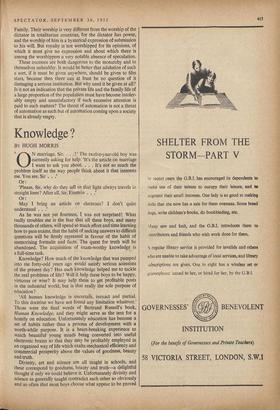The Cult of Titles
BY CHRISTOPHER HOLLIS /F I were a foreigner I should think that the English were a trifle dotty about titles, and the Scotch, when it comes to that, a trifle dottier still. The Welsh are better. There are no great Welsh titles. Spain and the Vatican are, I fancy, the only States other than ours which still bestow titles. Others, in Hamlet-like fashion, recognise those that already exist, but create no new ones. Therefore our attitude towards titles is at least odd. Because it is odd it is not therefore, I agree, neces- sarily to be condemned. It is most arguable that it is a wisdom in the British to have preserved the relics of the institutions of past forms of society and to have allowed freedom, if freedom it be, slowly to broaden down from precedent to precedent, that this is better than the dramatic and often bloody breaks with the past in which other countries have indulged. Anoma- lous and theoretically indefensible as the House of Lords is, it is not certain that it has done its work worse than other and less peculiar Second Chambers. Therefore there is something to be said for preserving the titles and orders that exist, and indeed I prefer the mild snobbery which airs its titles to the violent counter-snobbery of the professional egalitarian such as Mrs. Sidney Webb which ostentatiously and with a good deal of publicity refuses to air it.
Yet the condition of the system being tolerable is that every- one should treat it as to some extent a quasi-pantomime- should accept the title that happens to be his in the spirit in which he might good-humouredly agree to play a part in a Christmas charade, but that nobody should think that it really much matters what he is called. That there are many titled people who do accept their titles in this spirit I am well aware, but few things more shocked me in political life than the discovery how many people there are who take these handles desperately seriously—who are willing to hang about in corri- dors for a generation with the hope of getting in the end a word in front of their name or a few letters after it. The most shock- ing thing about the sale of honours was that so many people were willing to pay such large sums of money for honours which to them, at any rate, cannot possibly have been from their manner of acquiring them honourable. It shows a terrify- ing lack of self-sufficiency and emptiness of the soul if such things are required to bring them comfort. And I do find odd and humiliating the avidity with which, on the day of the New Year or Birthday Honours, so many Englishmen set aside important news and give themselves to the scanning of these ridiculous lists as their first task. I should, as I say, if I were a foreigner find it a little difficult to think such persons entirely sane.
It is true that if foreigners bother less about the titles that are written on an envelope than we do they bother more about the buttons that are worn on a lapel. It is a nice point which is the dottier worry. But let us not get bogged down in that contro- I versy. Original sin, alas, is universal, and 'if all foreigners arc mostly fools,' that unfortunately does not prove that we arc not fools, too. As I have said, there is something to be said for maintaining the' titles and orders that have come down from the past. Even though an earl is no longer the military captain of a county, let us have earls, and, even though chivalry—at any rate in its literal, horsey sense—be dead, let us keep the Garter. But it was an oddity of the Victorians that though they rode in railway trains and the machinery of chivalry had become meaningless, yet, not content with maintaining the orders that already existed, they greatly added to their number.
The consequence of all this was to make titles both more and less important. When every tradesman felt that he had a title in his till, people were more ambitious of titles than they had ever been. On the other hand, the magic that in simpler ages had surrounded a title was destroyed. Today for all the fuss that people make about titles no one imagines that even the senior of non-royal dukes is a creature that is not of this world. Yet magic survives, for there is one rank to which no . commoner cad aspire even in thought—the rank of royalty. So there is no longer a gradation from royalty through aristocracy to the common man. Between royalty and non-royalty there is a line absolute, and all royalty is beyond question magi.
There is a great deal to be said for the institution of monarchy. Other nations besides ours have found it convenient, and, since it is in our tradition, very few people in this country would, I fancy, wish to see it abolished—far fewer than was the case three-quarters of a century ago. Nor is a reasonable degree of curiosity about the true nature of the person who performs these ceremonial functions at all unnatural. There has always been throughout history a degree of curiositSr and gossip about the private lives of monarchs and other prominent persons. But what is odd is that this age, which, rightly or wrongly, has been of all ages the most jealous to see that the monarchy has no real power, has been the age which has gone far beyond any of its predecessors in the shamelessness and vulgarity of its curiosity about every detail of the private life not only of the Sovereign but—what is on this scale entirely new—of every member of the Royal Family, whether there is any likelihood of that member succeeding to the throne or not.
It is idle to say that this is the fault of the press. Of course it is the fault of the press, but the press would not write thus if there were not a public taste for such writing. I do not think that in any previous age people would have been willing to read such stories as are now served up to them about the Royal Family. They would have felt ashamed, as anyone would feel ashamed to pry in such detail into the private life of any human being. But they do not think of the members of the Royal Family as human beings. They think of them as the Phrygians of the first century thought of goddesses.
It is obviously highly desirable both that the Royal Family should deserve respect and, when spoken of, should be spoken of with respect. But there is no respect to the Royal Family in dragging before the public eye every gossipy detail, true or imagined, of its private life. In the decay of religion men must find some other God to worship. The serious-minded and prig- gish worship the State. The empty-headed worship the Royal Family. Their worship is very different from the worship of the dictator in totalitarian countries, for the dictator has power, and the worship of him is a hysterical expression of submission to his will. But royalty is 'not worshipped for its opinions, of which it must give no expression and about which there is among the worshippers a very notable absence of speculation.
These excesses are both dangerous to the monarchy and in themselves unhealthy. It would be better that adulation of such a sort, if it must be given anywhere, should be given to film stars, because then there can at least be no question of it damaging a serious institution. But why need it be given at all? Is it not an indication that the private life and the family life of a large proportion of the population must have become intoler- ably empty and unsatisfactory if such excessive attention is paid to such matters? The threat of automation is not a threat of automation as such but of automation coming upon a society that is already empty.



































 Previous page
Previous page